Vocational courses are career-focused courses that aim to develop industry-specific skills in a candidate to help them find a decent job in a particular domain or sector. The vocational courses can be done after completion of class 12, graduation, or post-graduation. Vocational courses are available in almost every sector in which traditional degrees are available.
The syllabus of vocational courses contains practical training sessions, laboratory sessions, and workshops. The vocational courses at the UG level offer a BVoc (Bachelors of Vocational Studies) degree and the PG level programs offer MVoc (Masters of Vocational Studies) degree. Diploma and Certification level Vocational Courses are also available.
Key Highlights of Vocational Courses
- Levels of Vocational Courses Available: Certificate, Diploma, Undergraduate (BVoc) , Postgraduate (MVoc).
- Duration: 6 months to 3 years (depending on the level of the course).
- Admission Process: Generally Merit Based, but few institutes conduct entrance exams.
- Top Entrance Exams: BHU UET, IPU CET, MHT CET.
- Average Course Fees: INR 3,000 - INR 2,00,000
- Important Specialisations: Software Development, Mobile Communications, Automobile, Retail, Photography, Secretarial Practices, etc.
- Job Options: Beverage Manager, Automobile or Diesel Mechanic, Photographer, Accountant, Salesman, Graphic Designer, Software Developer, Food Technician, etc.
- Average Salary Package: INR 4,00,000
- Area of Employment: IT Sector, Automobile Industry, Tourism and Hotel Industry, Fashion Industry, Entertainment Industry, etc
BVoc courses are for 3 years and can be done after completion of class 12. To become eligible to apply for BVoc courses, the candidates should have completed class 12 or diploma from a recognized board. UG vocational courses also award a certificate or diploma degrees if the candidate leaves the course before 3 years.
MVoc courses are a 2-year program that are specially designed to pursue higher studies after BVoc. The basic eligibility for MVoc is BVoc or any bachelor’s degree from a recognized university.
The admission to the vocational courses are either merit-based or through the entrance exam, depending upon the institute. The vocational courses are introduced by the UGC, thus they are valid and offered by various institutes.
There are more than 200 institutes in India that offer vocational courses. The average course fees for vocational courses range around INR 3,000 - INR 2,00,000 per annum.
Some of the top colleges that offer vocational courses are:
| NIRF College Ranking 2020 | Name of the Institute | City | Admission Process | Average Course Fees | Average Annual Salary |
|---|---|---|---|---|---|
| 7 | St. Xaviers College | Kolkata | Merit-based | INR 18, 200 | INR 5,50,000 |
| 37 | Jesus and Mary College | New Delhi | Merit-based | INR 16, 610 | INR 3,60,000 |
| 42 | Fergusson College | Pune | Merit-based | INR 45,650 | INR 4,50,000 |
| 73 | St. Francis College for Women | Hyderabad | Merit-based | INR 10,000 | INR 2,70,000 |
| 90 | St. Xaviers College | Mumbai | Merit-based | INR 7,355 | INR 4,00,000 |
The graduates after completion of vocational courses get jobs as a Food and Beverage Manager, Automobile, Diesel Mechanic, Photographer, Accountant, Salesman, Graphic Designer, Software Developer, Food Technician, etc. The average vocational course salary is expected to be around INR 4,00,000 per annum.
After completion of BVoc, if the candidate wants to pursue higher studies, then they can go for PG Diploma or MVoc courses. And after MVoc courses, they can go for MPhil or PhD.
What is the Admission Process for Vocational Courses?
Admission to the vocational courses is conducted either through the entrance exam or are based on merit. The common procedure followed by most of the institutes are:
- Step 1: Application: The candidates will have to check the eligibility and apply to the particular institute by filling up the application form, submitting the required documents, and paying the application fees.
- Step 2: Evaluation: Evaluation process may differ for every institute. It can either be through the entrance exam, where the students will be evaluated based on the marks scored in the entrance exam. The evaluation can also be done based on previous academic history.
- Step 3: Merit-list: A merit list of shortlisted students will be released. Students who have cleared the minimum cut-off will be shortlisted.
- Step 4: Counseling: Shortlisted candidates will be called for counseling to choose the courses.
- Step 5: Offer-letter: Offer letter will be sent to the selected students. Students can enroll after paying the initial amount.
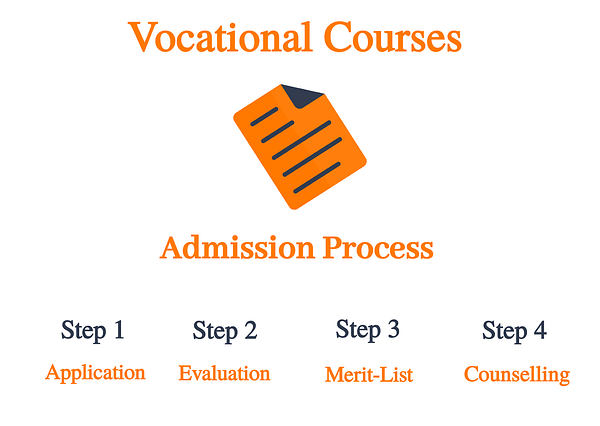
What is the Minimum Eligibility Criteria for Admission to Vocational Courses?
The candidates should fulfill the following minimum eligibility for admission to Vocational Courses:
- The candidate should have completed 10+2 or equivalent in any stream.
- They should score a minimum of 50% marks in 10+2 from a recognized board.
- There is a certain relaxation for reserved categories, that may differ from institute to institute.
- There is no age bar for admission to vocational courses.
Note: The Eligibility will vary with the level of the Vocational Courses.
Is There any Entrance Exam for Admission to Vocational Courses?
Some of the institutes take admissions to Vocational Courses on the basis of entrance exam. Some of the entrance exams for vocational courses are mentioned below:
-
IPU CET - It is a university level entrance exam conducted for admission into Indraprastha University into various courses, including vocational courses offered by the institute.
-
MHT CET - It is a state-level entrance exam for admission into various technical institutes in Maharashtra. MHT CET allows admission into various courses including vocational courses.
-
BHU UET - It is conducted by Banaras Hindu University to offer admission into various courses offered by the institute.
| Name of the examination | Mode of Examination | Application Period | Exam Date |
|---|---|---|---|
| IPU CET 2020 | Online | March 3, 2020 - August 11, 2020 | Not yet announced |
| MHT CET 2020 | Online | January 7, 2020 - June 1, 2020 | Not yet announced |
| BHU UET 2020 | Online | January 30, 2020 - March 21, 2020 | August 16 - 31, 2020 |
How to Prepare for the Entrance Exams?
To prepare for the Vocational Courses Entrance Exams, it is extremely important to understand the syllabus and know the exam pattern. According to that, the candidate can plan their preparation.
- The syllabus differs according to the subject being chosen for admission.
- Preparing the class 12th syllabus is useful since the syllabus usually consists of the topics studied in class 12th.
- Refer to the previous year's question papers to understand the pattern of the entrance exam.
- First, clear your concepts and then practice using the sample papers and then take mock tests.
Read more on the Exam Pattern of IPU CET.
How to Get Admission in Good Colleges Providing Vocational Courses?
- The candidates should fulfill the minimum eligibility criteria of the institute they want to apply.
- Conduct proper research and note down the date of the application process and the entrance exam.
- Prepare for the entrance exams as early as possible.
- Make a proper time table to study and prepare a strategy to clear the minimum cut-off.
- Also performing well in class 12th is important as some of the top institutes may take admissions based on the previous academic records.
Vocational Courses: What it is about?
- Vocational courses are career-focused courses that aim at equipping students with practical skills for a specific profession or field.
- It is a scheme launched by UGC on skill development to fulfill the demand of the skilled workforce in the market.
- Vocational courses cover areas like Engineering, Medicare, Arts & Science, Management, Commerce (Banking applications), Computer and its applications, and Food Management.
- These courses have multiple entry and exit points i.e, the students can choose to quit the course within a year or two.
- At UG level, a 6-month vocational course will be awarded with a certificate degree, 1-year with a diploma, 2 years with an advanced diploma, and 3 years with a BVoc Degree.
- Same at PG level, a 1-year vocational course will award a PG diploma and 2-year with an MVoc degree.
According to National Skills Qualification Framework (NSQF), the table below shows the type of vocational degrees awarded:
| NSQF Level | Level of Study | Duration |
|---|---|---|
| NSQF Level 4 | Certificate | 6 month |
| NSQF Level 5 | Diploma | 1 year |
| NSQF Level 6 | Advanced Diploma | 2 years |
| NSQF Level 7 | BVoc Degree | 3 years |
| NSQF Level 8 | PG Diploma | 1 year |
| NSQF Level 9 | MVoc Degree | 2 year |
| NSQF Level 10 | Research Level | Depends on the duration of the research |
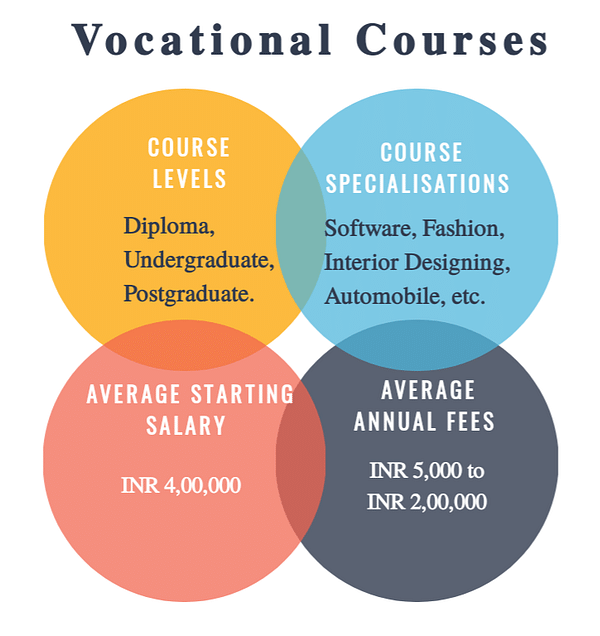
Vocational Courses Highlights
Vocational courses are in high demand since most of the top companies prefer skills over degrees. Some of the basic information about the vocational courses are mentioned below:
| Course level | UG and PG |
| Duration | BVoc (3 years), MVoc (2 years) |
| Examination Type | Semester wise |
| Eligibility | BVoc (10+2 in any stream) MVoc (BVoc or bachelors degree) |
| Admission Process | Entrance exam or merit-based |
| Average Course fees | INR 5,000 - INR 2,00,000 |
| Average Salary | INR 1,00,000 - INR 4,00,000 |
| Job Options | Technician, Food and Beverage Manager, Diesel Mechanic, Graphic Designer, Software Developer, Photographer, Sales Executive, etc |
| Areas of Employment | Automobile, Entertainment, Agriculture, Marketing, Construction, etc |
Why Should You Study Vocational Courses?
- This course provides hands-on experience and makes the students ready for a specific job.
- These courses are shorter, less expensive, and aimed at the needs of the industry.
- It provides the market with skilled professionals.
- The course is quite convenient because of multiple entries and exit points.
- These courses are good for students who could not complete their academic qualifications for certain reasons. They can also join these courses.
- They help the student to specialize in a specific area and help them get a job as soon as possible. The student becomes eligible to get a job even after completion of the 1-year course.
- These courses can also be done after completing certain academic qualifications. Then, these courses will act as add ons and would increase the value of your resume.
- The salaries for vocational courses candidates are mostly at par with the academic candidates and ranges between INR 1,00,000 to INR 4,00,000.
VVocational Courses vs Academic Courses
In India, academic courses are preferred more over vocational courses as they open up various career options. But the reason behind choosing an academic course is also the lack of awareness. It has been seen that there are more unemployed graduates after doing academic courses since it includes more of the classroom teaching, which differs a lot at the industrial level. Whereas the vocational courses provide skilled professionals who are able to find jobs as they are confident with their skills.
The basic difference between the vocational course and the traditional courses are mentioned below.
| Parameter | Vocational Courses | Academic Courses |
|---|---|---|
| Overview | It is a course of study that focuses on the practical aspects of education. It usually helps a student specialize in a specific field. | It is a course of study that focuses on both the theory and practical aspects of the study. |
| Duration | 1-3 years | 2-5 years |
| Degrees Offered | Certificate, Diploma, or Vocational degree | BTech, BSc, BCA, BCom, BBA, BA, etc |
| Minimum Eligibility | 10+2 | Depends on the level of study |
| Average Course Fees | INR 5,000 - INR 2,00,000 | INR 1,000 - INR 2,00,000 |
| Average Salary Package | INR 1,00,000 - INR 4,00,000 | INR 1,00,000 - INR 20,00,000 |
| Post completion of the course | Candidates are ready to find jobs only in the area they have specialized in. | Can find jobs in the area of their study or in other fields. |
| Higher study options | Higher study options are quite limited for vocational graduates. They can go for MVoc, after completion of BVoc. | MTech, MBA, MSc, MCA, MA, etc. |
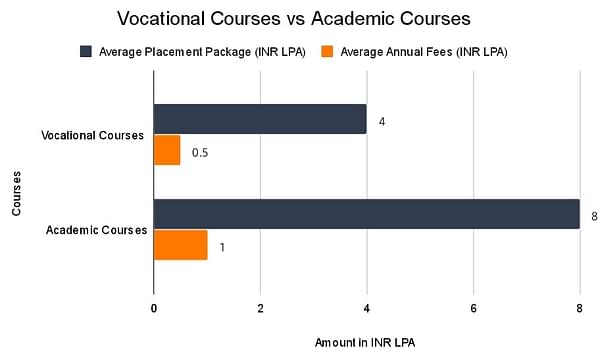
Source: College Websites
What are the Specialisations Available Under Vocational Courses?
There are many specialisations available under vocational courses. The most important specialisations are discussed below.
-
Software Development: B.Voc in Software Development course deals with all the skills and expertise required by a candidate to build softwares and computer applications successfully. Syllabus covered in this course includes programming languages, Computer architecture, etc.
| Average Annual Fees | INR 50,000 to INR 1,00,000 |
| Average Annual Salary | INR 4,00,000 |
-
Mobile Communication: This course includes all the important topics related to communication technology. The subjects covered in this course includes everything from radio technology, communication waves and their transmission, bandwidth, to mobile hardware and digital electronics.
| Average Annual Fees | INR 50,000 to INR 70,000 |
| Average Annual Salary | INR 2,50,000 to INR 3,50,000 |
-
Retail: This specialisation is appropriate for those who wish to build a career in retail marketing. It covers many important topics like customer psychology, communication skills, marketing tactics, etc.
| Average Annual Fees | INR 20,000 to INR 80,000 |
| Average Annual Salary | INR 3,00,000 to INR 3,50,000 |
-
Visual Merchandising: The candidates interested in advertising and Visual Merchandising industry. This course will teach students designing visuals, make them aware of the latest styles in advertising, and make them capable of designing their own advertising trend.
| Average Annual Fees | INR 40,000 to INR 1,00,000 |
| Average Annual Salary | INR 3,00,000 to INR 5,00,000 |
-
Interior Designing: This segment deals with the study of interior designing and related subjects. The topics covered include Crafts and Interior Design, Analytical Drawing, Designing Research, etc.
| Average Annual Fees | INR 30,000 to INR 1,00,000 |
| Average Annual Salary | INR 3,00,000 to INR 4,00,000 |
-
Food Processing Technology: This is a very relevant course which covers topics related to Food Processing. It covers every aspect of food processing like manual food processing, small scale food processing and large scale food processing.
| Average Annual Fees | INR 30,000 to INR 80,000 |
| Average Annual Salary | INR 3,00,000 to INR 3,50,000 |
-
Food and Beverage Services: Food and Beverage Services specialisation involves subjects related to Food, Beverage and Hotel industry. It will include topics like Bartending, Culinary Science, Beverage Manufacturing, etc along with Communication Skills. A sub-specialisation available in this stream is Bakery and Confectionery.
| Average Annual Fees | INR 40,000 to INR 1,00,000 |
| Average Annual Salary | INR 3,00,000 to INR 5,00,000 |
Which are the Top Colleges and Universities Providing Vocational Courses in India?
Some of the top colleges that offer vocational courses are mentioned below according to their college NIRF Rank 2020:
| NIRF Ranking 2020 | Name of the College | City | Average Course Fees |
|---|---|---|---|
| 7 | St. Xaviers College | Kolkata | INR 18, 200 |
| 37 | Jesus and Mary College | New Delhi | INR 16, 610 |
| 42 | Fergusson College | Pune | INR 45,650 |
| 73 | St. Francis College for Women | Hyderabad | INR 10,000 |
| 90 | St. Xaviers College | Mumbai | INR 7,355 |
Some of the top universities that offer vocational courses are mentioned below according to their university NIRF Rank 2020:
| NIRF Ranking 2020 | Name of the University | City | Average Course Fees |
|---|---|---|---|
| 3 | Banaras Hindu University | Varanasi | INR 23,962 |
| 13 | Bharathiar University | Coimbatore | INR 5,200 |
| 48 | University of Kashmir | Srinagar | INR 8,000 |
| 72 | Kalasalingam Academy of Research and Education | Krishnankovil | INR 30,000 |
| 101-150 | Annamalai University | Chidambaram | INR 20,000 |
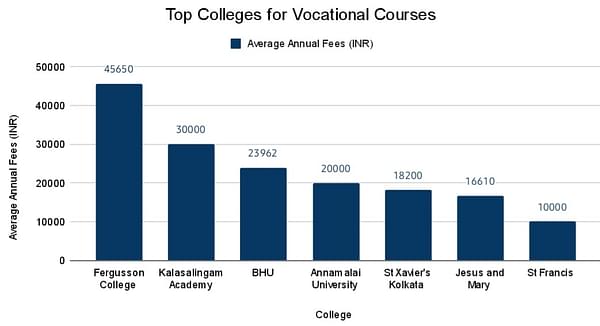
Source: College Websites
Vocational Courses College Comparison
A comparison has been done among the top 3 colleges offering vocational courses. The comparison is based on ranking, course fees, average salary, and top recruiters.
| Top Colleges | St. Xavier’s College | Banaras Hindu University | Bharathiar University |
|---|---|---|---|
| Location | Kolkata | Varanasi | Coimbatore |
| Overview | It is an autonomous institute affiliated to the University of Calcutta. It was established in 1860 and since then it has been offering UG, PG, diploma and certificate courses in various fields of study. | It is a central university in Varanasi, established in 1961. The courses in various fields of study and the admissions are based on the common entrance test known as BHU UET and BHU PET | It is a government university established in 1982. The university has 104 affiliated colleges that offer courses in the field of science, arts, education, management, air force, and physical education. |
| NIRF Ranking 2020 | 7 (Among top colleges) | 3 (Among top universities) | 13 (Among top universities) |
| Average Course Fees | INR 18,200 | INR 23,962 | INR 5,200 |
| Average Salary | INR 5,50,000 | INR 4,00,000 | INR 4,50,000 |
| Top Recruiters | Cognizant, Deloitte, Ernst & Young, Federal Bank, GODREJ, Google, IBM, Infosys, KPMG, Tata Capital, etc | Amazon, Flipkart, IBM, Infosys, Oracle, Wipro, Accenture, Microsoft, ICICI Bank, Berger, DHL, etc. | Infosys, Oracle, ITC, Reliance, NIIT, TATA Motors, Gillette, Jet Airways, etc. |
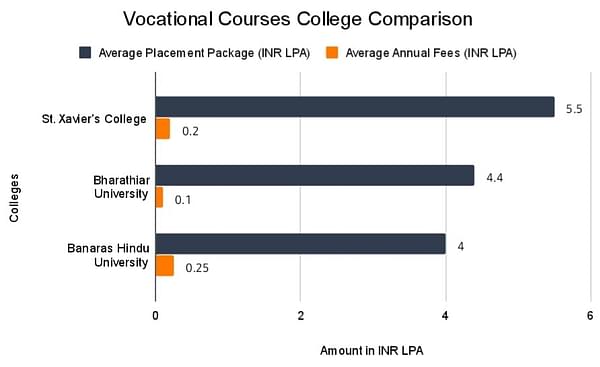
Source: College Websites
What are the Subjects Taught Under Vocational Courses?
The syllabus of vocational courses are a mix of general education and skill development i.e, it consists of 40% theory (general education) and 60% training or practical.
The syllabus will differ for every vocational course. The subjects included in vocational courses will be similar as it is designed by UGC itself. The curriculum consists of the following:
- Theory papers
- 1 Elective paper
- 1 General Elective Paper
- Practicals on theory paper
- Practical on elective paper
- Workshops
- Project
- Industrial Training
Below are the subjects of BVoc Automobile offered by Guru Gobind Singh Indraprastha University:
| Semester 1 | Semester 2 |
|---|---|
| Elements of Automobile Engineering | Engineering Materials & Mechanics of Solids |
| Manufacturing Technology | Automobile Servicing and Maintenance |
| Communication Skills | Environmental Science |
| Basic Programming lab | Practicals |
| Vocational Workshop | Project |
| Practicals | Industrial Training |
| - | Graphics for Automobile Engineering |
| Semester 3 | Semester 4 |
| Thermal Engineering | Internal Combustion Engines |
| Chassis Body & Transmission | Alternative Fuels & Pollution Control |
| Instruments and Equipment | Tractors, Farm Equipment, and Off-Road Vehicles |
| Automotive Component Design | Practicals |
| Energy Sources for Automobiles | Industrial Training |
| Practicals | Project |
| Industrial Training | - |
| Semester 5 | Semester 6 |
| Technical English | Automotive Electricals & Electronic System |
| Vehicle Body Engineering | Industrial Training |
| Practicals | Practicals |
| Minor Project | Major project |
| Industrial Training | - |
What are the Job Prospects & Career Options After Completing Vocational Courses?
- Vocational courses have specialisations like automobile, entertainment, agriculture, information technology, telecommunication, marketing, construction, tourism, applied arts, etc.
- There are various specializations available in the above-mentioned sectors and candidates can easily find jobs after completing this skill development program.
- The graduates after vocational courses can work as a food and beverage manager, automobile or diesel mechanic, photographer, accountant, salesman, graphic designer, software developer, food technician, etc.
- The average salary expected after completion of the vocational courses is around INR 4 lakh per annum.
Some of the job options available to the vocational degree holders are:
| Jobs | Description | Average Salary |
|---|---|---|
| Bartender | Their work is to prepare and serve drinks to the customer. They usually work in bars, nightclubs, hotels, or in various events. The candidates who have done a Diploma in Food & Beverage Services can work as a bartender. | INR 2,28,500 |
| Software Developer | Students who have completed their studies in BVoc Software Development can work as a Software Developer. Their work is to develop computer applications or to customize the existing one. | INR 4,91,000 |
| Accountant | They perform calculations and maintain records of the finances of the company. Their work includes creating sales and cash flow reports, administering payroll, keeping balance sheets, carrying out billing activities, managing budgets, and keeping inventory. The candidates can work as an accountant after the competition of Certificate of Diploma in Finance and Accounting. | INR 2,48,800 |
| Photographer | They capture pictures of people, places, and objects. They are usually hired to take pictures for product marketing, or at memorable events like weddings, graduation, or other events. Candidates can work as a photographer after completion of a minimum Diploma in Photography. | INR 3,66,000 |
| Diesel Mechanic | Their work is to maintenance, repair, and overall care for diesel vehicles like buses, boats, trucks, bulldozers, etc. | INR 2,01,500 |
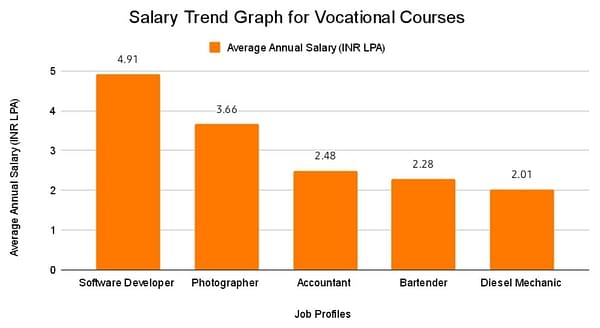
Source: Payscale
What is the Future Scope After Completing Vocational Courses?
Our country is facing a demand-supply mismatch for skilled professionals. Therefore UGC decided to introduce vocational courses to fulfill the demand of the skilled workforce and provide the market with a bulk amount of skilled professionals to boost our economy.
- Vocational courses are new to the education industry and guarantee a job after completion of the course.
- Currently, there is a need for skilled professionals in every sector. So the candidates who have worked on upgrading their skills will find jobs easily.
- Students who have financial issues and cannot afford to study for 3 years can choose to quit the course after 1 year or 2 years. They will still be awarded diploma degrees and can find jobs in a specific area. They can continue their studies later on from where they left.
Vocational Courses FAQs
Ques. What sort of skills are referred to as vocational skills?
Ans. Vocational skills are occupations that are taught in vocational courses through practical training. Some of such occupation skills include electricians, truck drivers, hairstylists, medical technicians, etc.
Ques. What does vocational training mean?
Ans. Ans skills that are learned if leads to a specific job, then it is referred to as vocational training. For example, learning to become a chef, repairing cars, etc.
Ques. Is a vocational degree valid?
Ans. Yes, vocational degrees are valid as it has been introduced by UGC itself and they have very specific standards designed to carry out these courses.
Ques. Is vocational courses better than traditional courses?
Ans. It totally depends on what the student wants to pursue after completion of the graduation degree. If the candidate is looking for an immediate job then vocational courses would work best. But if the candidate wants to have an in-depth study and have plans for higher studies and research work, then they should go for traditional courses.
Ques. How to get into vocational training?
Ans. The candidate should fulfill the minimum eligibility criteria i.e, they should have completed class 12 or equivalent.
Ques. What are the specializations available in vocational training?
Ans. According to UGC, they have designed the following specializations mentioned below. Though there are more specializations that the institutes keep adding to their list.
| Sector | Specializations |
|---|---|
| Automobile | Engine Testing, Vehicle Testing, Vehicle Quality, Auto Electrical and Electronics, Farm Equipment, and Machinery. |
| Entertainment | Theatre and Stage Craft, Contemporary Western Dance, Theatre Studies, Acting |
| Information Technology | Software Development |
| Telecommunication | Mobile Communication |
| Marketing | Retail |
| Agriculture | Farm Machinery & Power Engineering, Green House Technology, Renewable Energy, Processing & Food Engineering, Soil & Water Conservation |
| Construction | Building Technology |
| Tourism | Tourism and Service Industry |
| Applied Arts | Fashion Technology, Interior Design, Jewellery Design |
| Printing and Publishing | Printing Technology |
Ques. What are the disadvantages of vocational courses?
Ans. There are some disadvantages to vocational courses like:
- The jobs offered through vocational courses are usually low paying positions. The course is designed to fulfill the skilled workforce demand that will usually occupy the lower sections of the hierarchy.
- The academic study is quite less in the course, so the candidates may not have in-depth knowledge to conduct research in their field.
- Though the courses are low cost a huge amount of money is spent on the tools and equipment and on workshops and materials.
- The candidates with traditional degrees are however preferred over the candidates with vocational degrees.
Found 1316 colleges
| CD Rank | Colleges | Course Fees | Placement | User Reviews | Ranking |
|---|---|---|---|---|---|
| #1 |  TISS Tata Institute of Social Sciences, Mumbai Mumbai, Maharashtra | ₹ 46,200UG Certificate in Vocational Courses- Total FeesCompare Fees | ₹ 27,22,000Average Package₹ 49,00,000Highest PackageCompare Placement | -- | |
| #2 | ![Jamia Millia Islamia University-[JMI] logo](https://images.collegedunia.com/public/college_data/images/logos/1491558776logo.jpg?tr=h-43,w-43,c-force) Jamia Millia Islamia University-[JMI], New Delhi New Delhi, Delhi NCR | ₹ 44,300Bachelors in Vocational Courses- 1st Year FeesCompare Fees | ₹ 9,00,000Average Package₹ 25,00,000Highest PackageCompare Placement | 4 / 10 Based on 14 User ReviewsBest in Infrastructure | -- |
| #3 | ![Banaras Hindu University - [BHU] logo](https://images.collegedunia.com/public/college_data/images/logos/1434627772BHU.jpg?tr=h-43,w-43,c-force) Banaras Hindu University - [BHU], Varanasi Varanasi, Uttar Pradesh | ₹ 21,981Bachelors in Vocational Courses- 1st Year FeesCompare Fees | ₹ 7,40,000Average Package₹ 14,00,000Highest PackageCompare Placement | 4.4 / 10 Based on 65 User ReviewsBest in Infrastructure | -- |
| #4 | ![Anna University - [AU] logo](https://images.collegedunia.com/public/college_data/images/logos/1505190694download.png?tr=h-43,w-43,c-force) Anna University - [AU], Chennai Chennai, Tamil Nadu | --Bachelors in Vocational Courses | ₹ 7,00,000Average Package₹ 36,00,000Highest PackageCompare Placement | 4 / 10 Based on 474 User ReviewsBest in Academics | -- |
| CD Rank | Colleges | Course Fees | Placement | User Reviews | Ranking |
|---|---|---|---|---|---|
| #5 | ![Panjab University - [PU] logo](https://images.collegedunia.com/public/college_data/images/logos/15040653671413791580PunjabUniversityChandigarhPU.jpg?tr=h-43,w-43,c-force) Panjab University - [PU], Chandigarh Chandigarh, Chandigarh | ₹ 14,020UG Certificate in Vocational Courses- Total Fees | -- | 7.8 / 10 Based on 12 User Reviews | -- |
| #6 |  Loyola College, Chennai Chennai, Tamil Nadu | ₹ 23,000Bachelors in Vocational Courses- 1st Year FeesCompare Fees | -- | 4 / 10 Based on 1 User ReviewsBest in Infrastructure | -- |
| #7 |  Fergusson College, Pune Pune, Maharashtra | ₹ 45,650Bachelors in Vocational Courses- 1st Year FeesCompare Fees | -- | 4.6 / 10 Based on 4 User ReviewsBest in Infrastructure | -- |
| #8 | ![Institute of Hotel Management - [IHM] logo](https://images.collegedunia.com/public/college_data/images/logos/1425026319ttou.png?tr=h-43,w-43,c-force) Institute of Hotel Management - [IHM], Bangalore Bangalore, Karnataka | ₹ 89,975UG Diploma in Vocational Courses- Total Fees | -- | -- |
| CD Rank | Colleges | Course Fees | Placement | User Reviews | Ranking |
|---|---|---|---|---|---|
| #9 | --UG Diploma in Vocational Courses | ₹ 1,92,000Average Package₹ 6,50,000Highest PackageCompare Placement | -- | ||
| #10 |  St. Xavier's College, Mumbai Mumbai, Maharashtra | ₹ 7,355Bachelors in Vocational Courses- 1st Year FeesCompare Fees | ₹ 6,00,000Average Package₹ 21,00,000Highest Package100% PlacementCompare Placement | -- | |
| #11 | ![Saveetha Institute of Medical And Technical Sciences - [SIMATS] logo](https://images.collegedunia.com/public/college_data/images/logos/1550657767logo.jpg?tr=h-43,w-43,c-force) Saveetha Institute of Medical And Technical Sciences - [SIMATS], Chennai Chennai, Tamil Nadu | --Certificate in Vocational Courses | -- | -- | -- |
| #12 | ![Aligarh Muslim University - [AMU] logo](https://images.collegedunia.com/public/college_data/images/logos/1504180374logo.jpg?tr=h-43,w-43,c-force) Aligarh Muslim University - [AMU], Aligarh Aligarh, Uttar Pradesh | ₹ 1,00,820UG Diploma in Vocational Courses- 1st Year FeesCompare Fees | ₹ 4,50,000Average Package₹ 6,50,000Highest PackageCompare Placement | 3.6 / 10 Based on 45 User ReviewsBest in Infrastructure | -- |
| CD Rank | Colleges | Course Fees | Placement | User Reviews | Ranking |
|---|---|---|---|---|---|
| #13 |  PSG College of Arts and Science, Coimbatore Coimbatore, Tamil Nadu | ₹ 14,850Bachelors in Vocational Courses- 1st Year FeesCompare Fees | -- | 4.4 / 10 Based on 11 User ReviewsBest in Infrastructure | -- |
| #14 | ![Madras Christian College - [MCC] logo](https://images.collegedunia.com/public/college_data/images/logos/1393668198Madras Christian College.png?tr=h-43,w-43,c-force) Madras Christian College - [MCC], Chennai Chennai, Tamil Nadu | --Bachelors in Vocational Courses | ₹ 2,31,200Average Package₹ 3,00,000Highest PackageCompare Placement | 4.6 / 10 Based on 1 User ReviewsBest in Social Life | -- |
| #15 | ![Mount Carmel College - [MCC] logo](https://images.collegedunia.com/public/college_data/images/logos/1504523545logo.png?tr=h-43,w-43,c-force) Mount Carmel College - [MCC], Bangalore Bangalore, Karnataka | --Bachelors in Vocational Courses | ₹ 2,95,000Average Package₹ 7,50,000Highest PackageCompare Placement | 4.5 / 10 Based on 4 User ReviewsBest in Social Life | -- |
| #16 | --UG Diploma in Vocational Courses | -- | 7.8 / 10 Based on 1 User ReviewsBest in Placements | -- |
| CD Rank | Colleges | Course Fees | Placement | User Reviews | Ranking |
|---|---|---|---|---|---|
| #17 | ₹ 15,165UG Diploma in Vocational Courses- Total FeesCompare Fees | ₹ 3,00,000Highest PackageCompare Placement | -- | ||
| #18 |  PSGR Krishnammal College for Women, Coimbatore Coimbatore, Tamil Nadu | --Bachelors in Vocational Courses | -- | 4.6 / 10 Based on 3 User ReviewsBest in Academics | -- |
| #19 | ![Babasaheb Bhimrao Ambedkar University - [BBAU] logo](https://images.collegedunia.com/public/college_data/images/logos/1485518600logo1.jpg?tr=h-43,w-43,c-force) Babasaheb Bhimrao Ambedkar University - [BBAU], Lucknow Lucknow, Uttar Pradesh | ₹ 20,000Bachelors in Vocational Courses- 1st Year Fees | -- | 4 / 10 Based on 8 User ReviewsBest in Infrastructure | -- |
| #20 | ![Manipal Academy of Higher Education - [MAHE] logo](https://images.collegedunia.com/public/college_data/images/logos/1617277594image2.png?tr=h-43,w-43,c-force) Manipal Academy of Higher Education - [MAHE], Manipal Manipal, Karnataka | ₹ 5,80,000Bachelors in Vocational Courses- Total FeesCompare Fees | ₹ 43,31,000Highest PackageCompare Placement | 4.1 / 10 Based on 26 User ReviewsBest in Infrastructure | -- |
| CD Rank | Colleges | Course Fees | Placement | User Reviews | Ranking |
|---|---|---|---|---|---|
| #21 |  St Joseph's University, Bangalore Bangalore, Karnataka | ₹ 73,760Bachelors in Vocational Courses- 1st Year Fees | -- | 8.5 / 10 Based on 4 User Reviews | -- |
| #22 | ₹ 99,000UG Diploma in Vocational Courses- Total Fees | -- | -- | ||
| #23 |  Ramnarain Ruia Autonomous College, Mumbai Mumbai, Maharashtra | --Bachelors in Vocational Courses | -- | -- | |
| #24 |  St Xavier's College, Ahmedabad Ahmedabad, Gujarat | --Certificate in Vocational Courses | -- | 4.4 / 10 Based on 7 User ReviewsBest in Social Life | -- |
| CD Rank | Colleges | Course Fees | Placement | User Reviews | Ranking |
|---|---|---|---|---|---|
| #25 | ![Gujarat University - [GU] logo](https://images.collegedunia.com/public/college_data/images/logos/1481521529lofo gu.png?tr=h-43,w-43,c-force) Gujarat University - [GU], Ahmedabad Ahmedabad, Gujarat | ₹ 6,000UG Certificate in Vocational Courses- Total FeesCompare Fees | -- | 4.1 / 10 Based on 149 User ReviewsBest in Faculty | -- |
| #26 | ₹ 80,400UG Diploma in Vocational Courses- Total Fees | -- | -- | ||
| #27 | ![Savitribai Phule Pune University - [SPPU] logo](https://images.collegedunia.com/public/college_data/images/logos/1483942831uop_logo.jpg?tr=h-43,w-43,c-force) Savitribai Phule Pune University - [SPPU], Pune Pune, Maharashtra | --UG Diploma in Vocational Courses | ₹ 6,50,000Average Package₹ 14,75,000Highest PackageCompare Placement | 4 / 10 Based on 385 User ReviewsBest in Academics | -- |
| #28 | ![Delhi University - [DU] logo](https://images.collegedunia.com/public/college_data/images/logos/1491817267UniversityofDelhi.png?tr=h-43,w-43,c-force) Delhi University - [DU], New Delhi New Delhi, Delhi NCR | --Bachelors in Vocational Courses | ₹ 24,00,000Average Package₹ 58,80,000Highest PackageCompare Placement | 3.9 / 10 Based on 1542 User ReviewsBest in Academics | -- |
| CD Rank | Colleges | Course Fees | Placement | User Reviews | Ranking |
|---|---|---|---|---|---|
| #29 | ![Institute of Hotel Management - [IHM] logo](https://images.collegedunia.com/public/college_data/images/logos/1423156704png.png?tr=h-43,w-43,c-force) Institute of Hotel Management - [IHM], Gandhinagar Gandhinagar, Gujarat | --UG Diploma in Vocational Courses | -- | 2 / 10 Based on 1 User ReviewsBest in Faculty | -- |
| #30 |  B.K Birla College Of Arts Science & Commerce, Thane Thane, Maharashtra | ₹ 1,500UG Certificate in Vocational Courses- Total Fees | -- | 4.7 / 10 Based on 2 User ReviewsBest in Infrastructure | -- |

![Banaras Hindu University - [BHU] logo](https://images.collegedunia.com/public/college_data/images/logos/1434627772BHU.jpg?tr=h-25,w-25,c-force)
![Institute of Hotel Management Catering Technology and Applied Nutrition - [IHM] logo](https://images.collegedunia.com/public/college_data/images/logos/1438067962banner-logo1503.jpg?tr=h-43,w-43,c-force)
![Institute Of Hotel Management Catering Technology & Applied Nutrition- [IHMH ] logo](https://images.collegedunia.com/public/college_data/images/logos/1515242899Untitled.png?tr=h-43,w-43,c-force)
![Institute of Hotel Management Catering Technology and Applied Nutrition - [IHM] logo](https://images.collegedunia.com/public/college_data/images/logos/1511333759logoihm.png?tr=h-43,w-43,c-force)
![Babasaheb Bhimrao Ambedkar University - [BBAU] logo](https://images.collegedunia.com/public/college_data/images/logos/1485518600logo1.jpg?tr=h-25,w-25,c-force)
![Institute of Hotel Management Catering Technology & Applied Nutrition - [IHM] logo](https://images.collegedunia.com/public/college_data/images/logos/1623137690ihm.png?tr=h-43,w-43,c-force)
![Institute of Hotel Management Catering Technology and Applied Nutrition - [IHM] logo](https://images.collegedunia.com/public/college_data/images/logos/1438240221IHMGOA.png?tr=h-43,w-43,c-force)


